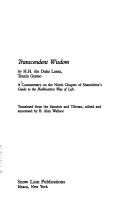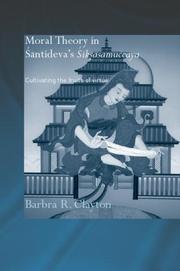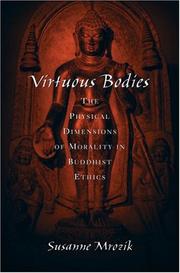| Listing 1 - 8 of 8 |
Sort by
|

ISBN: 0937938653 Year: 1988 Publisher: Ithaca (N.Y.): Snow lion
Abstract | Keywords | Export | Availability | Bookmark
 Loading...
Loading...Choose an application
- Reference Manager
- EndNote
- RefWorks (Direct export to RefWorks)
Mahayana Buddhism --- Doctrines --- Śāntideva,
Book
ISBN: 0231549903 0231192665 9780231192668 9780231192675 0231192673 9780231549905 Year: 2019 Publisher: New York
Abstract | Keywords | Export | Availability | Bookmark
 Loading...
Loading...Choose an application
- Reference Manager
- EndNote
- RefWorks (Direct export to RefWorks)
Śāntideva's eighth-century work, the Guide to Bodhisattva Practice (Bodhicaryāvatāra), is known for its eminently practical instructions and its psychologically vivid articulations of the Mahāyāna path. It is a powerful, succinct poem into which are woven diverse Buddhist traditions of moral transformation, meditative cultivation, and philosophical insight. Since its composition, it has seen continuous use as a ritual, contemplative, and philosophical manual, making it one of the crucial texts of the Buddhist ethical and philosophical tradition.This book serves as a companion to this Indian Buddhist classic. The fifteen essays contained here illuminate the Guide's many philosophical, literary, ritual, and ethical dimensions. Distinguished scholars discuss the historical significance of the text as an innovative piece of Indian literature, illuminate the important roles it played in shaping Buddhism in Tibet, and bring to light its contemporary significance for philosophy and psychology. Whether experienced or first-time students of Buddhist literature, readers will find compelling new approaches to this resonant masterpiece.
Mahayana Buddhism --- RELIGION / Buddhism / Tibetan. --- Doctrines. --- Śāntideva,

ISBN: 0415346967 9780415346962 9780203639962 9781134278244 9781134278282 9781134278299 9780415599351 Year: 2006 Publisher: London : Routledge,
Abstract | Keywords | Export | Availability | Bookmark
 Loading...
Loading...Choose an application
- Reference Manager
- EndNote
- RefWorks (Direct export to RefWorks)
This book analyses the moral theory of the seventh century Indian Mahayana master, Santideva. Santideva is the author of the well-known religious poem the 'Bodhicaryavatara (Entering the Path of Enlightenment)', as well as the significant, but relatively overlooked, 'Siksasamuccaya (Compendium of Teachings)'. Both of these works describe the nature and path of the bodhisattva, the altruistic spiritual ideal especially exalted in Mahayana literature. With particular focus on the 'Siksasamuccaya', this work offers a response to three questions: What is Santideva's moral theory? How does it compare to other analyses of Buddhist ethics? Can one moral theory adequately describe Buddhist moral thought? An exegetical account of the 'bodhisattva' path as outlined in the 'Siksasamuccaya' is provided by textual analysis and translations. The central moral concept of this Buddhist thinker and Santideva's ethical presuppositions and moral reasoning are brought to light by analysing the use of key moral terms and comparing them to other Buddhists' principles. It is also considered in relation to dominant Western ethical theories. By focusing on a neglected Buddhist Sanskrit text by a major Mahayana figure, Barbra Clayton helps to redress a significant imbalance in the scholarship on Buddhist ethics, which has up to now focused primarily on the ethics of the Pali literature and as interpreted in the Theravada tradition.
Buddhist ethics. --- Śāntideva, --- Śāntideva, --- Śāntideva (0685?-0763?) --- Śāntideva (0685?-0763?). Śikṣāsamuccaya --- Sectes bouddhiques --- Inde --- Morale --- Civilisation --- Śāntideva (0685?-0763?) --- Śāntideva (0685?-0763?). Śikṣāsamuccaya
Book
ISBN: 0042940729 Year: 1971 Publisher: London : Allen and Unwin,
Abstract | Keywords | Export | Availability | Bookmark
 Loading...
Loading...Choose an application
- Reference Manager
- EndNote
- RefWorks (Direct export to RefWorks)
Buddhism --- Doctrines. --- Mahayana Buddhism --- Śāntideva --- Bodhicaryāvatāra --- Texts
Book
ISBN: 1317033701 1317033698 1409466825 9781409466826 9781306069830 1306069831 9781409466819 1409466817 9781409466833 9781315616216 9781317033684 9781317033691 9781138272293 1315616211 9781317033707 Year: 2013 Publisher: Farnham: Ashgate,
Abstract | Keywords | Export | Availability | Bookmark
 Loading...
Loading...Choose an application
- Reference Manager
- EndNote
- RefWorks (Direct export to RefWorks)
Exploring the philosophical concerns of the nature of self, this book draws from two of the most influential Indian masters, Śaṅkara and Śāntideva. Todd demonstrates that an ethics of altruism is still possible within a metaphysics which assumes there to be no independent self. A new ethical model based on the notions of ’flickering consciousness’ and ’constructive altruism’ is proposed. By comparing the metaphysics and ethics of Śaṅkara and Śāntideva, Todd shows that the methodologies and aims of these Buddhist and Hindu masters trace remarkably similar cross-cutting paths. Treating Buddhism and Hinduism with equal respect, this book compares and reinterprets the Indian material so as to engage with contemporary Western debates on self and to show that Indian philosophy is indeed a philosophy of dialogue.
Religious ethics --- Religions --- Ethics --- History. --- Śaṅkarācārya --- Śāntideva, --- Çāntideva, --- Chi-tʻien-lun-shih, --- Chŏkchʻŏn, --- Hsi-wa-la, --- Jitian, --- Śanti-deva, --- Shanti Deva, --- Shantideva, Acharya, --- Shantideva, --- Shanzav, --- Syantʻideva, --- Xiwala, --- Zhi ba lha, --- Źi-ba-lha, --- Шантидева, --- Шанзав, --- 寂天菩薩, --- 샨티데바, --- Cankara --- Śankarāchārya --- Śankarācārya --- Ethics. --- Shantidėva, --- Шантидэва, --- Śāntideva, - active 7th century
Book
ISBN: 9789042938489 904293848X 9789042938496 Year: 2019 Volume: [9] Publisher: Leuven Peeters
Abstract | Keywords | Export | Availability | Bookmark
 Loading...
Loading...Choose an application
- Reference Manager
- EndNote
- RefWorks (Direct export to RefWorks)
The Bodhicaryavatara ("Entering the Course towards Awakening") is an Indian Mahayana Buddhist companion to the path of a Bodhisattva, someone motivated by the altruistic "spirit of awakening". Unlike many other Buddhist scriptures, much of this text is written in the very touching form of personal reflections. Despite its late composition (7th-8th cent. CE), the Bodhicaryavatara quickly gained widespread recognition and high appraisal in various parts of the Buddhist world and even beyond. Today it is one of the most widely translated Buddhist texts. The 14th Dalai Lama has emphasized the special impact of this scripture on his own spirituality, and a number of Western scholars have praised it as a true gem among the world's religious classics. After many commentaries by Buddhist scholars throughout the centuries, this is the first commentary from a Christian perspective, exploring the deep resonances between the "spirit of awakening" and the "spirit of Christ".
Mahayana Buddhism --- Buddhism --- Christianity and other religions --- Doctrines --- Relations&delete& --- Christianity --- Śāntideva, --- Buddha and Buddhism --- Lamaism --- Ris-med (Lamaism) --- Religions --- 294.316.1 --- 294.316.1 Boeddhisme: christendom --- Boeddhisme: christendom --- Relations
Book
ISBN: 0823285995 0823281256 0823281264 0823281248 9780823281237 9780823281244 082328123X Year: 2018 Publisher: New York, NY : Fordham University Press,
Abstract | Keywords | Export | Availability | Bookmark
 Loading...
Loading...Choose an application
- Reference Manager
- EndNote
- RefWorks (Direct export to RefWorks)
Winner of the Frederick Streng Book Award for Excellence in Buddhist-Christian Studies This work provides the first systematic discussion of the Bodhisattva path and its importance for constructive Christian theology. Crucified Wisdom examines specific Buddhist traditions, texts, and practices not as phenomena whose existence requires an apologetic justification but as wells of tested wisdom that invite theological insight. With the increasing participation of Christians in Buddhist practice, many are seeking a deeper understanding of the way the teachings of the two traditions might interface. Christ and the Bodhisattva are often compared superficially in Buddhist–Christian discussion. This text combines a rich exposition of the Bodhisattva path, using Śāntideva’s classic work the Bodicaryāvatāra and subsequent Tibetan commentators, with detailed reflection on its implications for Christian faith and practice.Author S. Mark Heim lays out root tensions constituted by basic Buddhist teachings on the one hand, and Christian teachings on the other, and the ways in which the Bodhisattva or Christ embody and resolve the resulting paradoxes in their respective traditions. An important contribution to the field of comparative theology in general and to the area of Buddhist–Christian studies in particular, Crucified Wisdom proposes that Christian theology can take direct instruction from Mahāyāna Buddhism in two respects: deepening its understanding of our creaturely nature through no-self insights, and revising its vision of divine immanence in dialogue with teachings of emptiness. Heim argues that Christians may affirm the importance of novelty in history, the enduring significance of human persons, and the Trinitarian reality of God, even as they learn to value less familiar, nondual dimensions of Christ’s incarnation, human redemption, and the divine life.Crucified Wisdom focuses on questions of reconciliation and atonement in Christian theology and explores the varying interpretations of the crucifixion of Jesus in Buddhist–Christian discussion. The Bodhisattva path is central for major contemporary Buddhist voices such as the Dalai Lama and Thích Nhât Hanh, who figure prominently as conversation partners in the text. This work will be of particular value for those interested in “dual belonging” in connection to these traditions.
Mahayana Buddhism --- Theology. --- Buddhism --- Christianity and other religions --- Christian theology --- Theology --- Theology, Christian --- Christianity --- Religion --- Doctrines. --- Relations --- Christianity. --- Buddhism. --- Lamaism --- Śāntideva, --- Christianity and other religions - Buddhism. --- Buddhism - Relations - Christianity. --- Mahayana Buddhism - Doctrines.

ISBN: 9780195305005 0195305000 0199785686 1281163023 1435620100 9786611163020 0198041497 Year: 2007 Publisher: New York Oxford University Press
Abstract | Keywords | Export | Availability | Bookmark
 Loading...
Loading...Choose an application
- Reference Manager
- EndNote
- RefWorks (Direct export to RefWorks)
Virtuous Bodies breaks new ground in the field of Buddhist ethics by investigating the diverse roles bodies play in ethical development. Traditionally, Buddhists assumed a close connection between body and morality. Thus Buddhist literature contains descriptions of living beings that stink with sin, are disfigured by vices, or are perfumed and adorned with virtues. Taking an influential early medieval Indian Mahayana Buddhist text-Santideva's Compendium of Training (Siksasamuccaya)-as a case study, Susanne Mrozik demonstrates that Buddhists regarded ethical development as a process of physical and moral transformation. Mrozik chooses The Compendium of Training because it quotes from over one hundred Buddhist scriptures, allowing her to reveal a broader Buddhist interest in the ethical significance of bodies. The text is a training manual for bodhisattvas, especially monastic bodhisattvas. In it, bodies function as markers of, and conditions for, one's own ethical development. Most strikingly, bodies also function as instruments for the ethical development of others. When living beings come into contact with the virtuous bodies of bodhisattvas, they are transformed physically and morally for the better. Virtuous Bodies explores both the centrality of bodies to the bodhisattva ideal and the corporeal specificity of that ideal. Arguing that the bodhisattva ideal is an embodied ethical ideal, Mrozik poses an array of fascinating questions: What does virtue look like? What kinds of physical features constitute virtuous bodies? What kinds of bodies have virtuous effects on others? Drawing on a range of contemporary theorists, this book engages in a feminist hermeneutics of recovery and suspicion in order to explore the ethical resources Buddhism offers to scholars and religious practitioners interested in the embodied nature of ethical ideals.
Body, Human --- Buddhist ethics. --- Religious aspects --- Buddhism. --- Śāntideva, --- 294.35 --- Religious ethics --- Human beings --- Body image --- Human anatomy --- Human physiology --- Mind and body --- Boeddhisme: Dhamma--(morele wet) --- Santideva, --- Śāntideva, --- Human body --- 294.35 Boeddhisme: Dhamma--(morele wet) --- Buddhist ethics --- Religious aspects&delete& --- Buddhism --- Body, Human - Religious aspects - Buddhism. --- Śāntideva, - 7th cent. - Śikṣāsamuccaya.
| Listing 1 - 8 of 8 |
Sort by
|

 Search
Search Feedback
Feedback About UniCat
About UniCat  Help
Help News
News